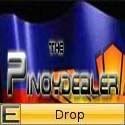Monday, May 18, 2009
Mosquito larva. This is the real true betta food. Bettas eat tones of them in the rice paddies of Thailand, so it is a great choice of food. One slight tiny problem though: finding the damn things. In short, unless you have them pesky little insects around, you won’t be able to get larva to your bettas. Be careful also to not harvest from dirty water (where bacteria might be flourishing) so you don’t bring a diseases back into your tank.
Live brine shrimp. If you have a lot of money, go for it. You can buy them at your local fish store, and your bettas will love you like, forever. To use as a treat only and as I said earlier, in moderation.
Live worms. (I strongly advise against using this type of food). Brown worms, blood worms, any worms your fish store will sell you, any cultures that will produce live worms, in short bettas LOVE worms. And in this case, you should be able to easily find live worms at your local fish store. I do NOT recommend picking worms from gardens, etc.. As they may have been subjected to pesticides etc… When you feed live worms to your betta, FIRST CLEAN THE WORMS THOROUGHLY. Worms can carry tones of bacteria and parasites. I used to feed live brown worms to my bettas, and brown worms are especially yucky. Although my bettas loved eating them, I soon developed a heavy love/hate relation with the wormies: Invariably, after feeding live food for a period of time, a bacterial outbreak would sweep through my fishroom and the rate of dropsy would climb. No live food, almost never any dropsy. So I finally decided to give them up completely :((. If you like playing with fire, you can feed live worms. To wash live worms, dump them into a brine shrimp net and let COLD water run on them, rinsing them, for a good one minute. Brown worms need to be stored in a container, with only enough water to cover their bodies (no more) and placed in your refrigerator. You should open the container daily and rinse the worms, whether you intend to use them or not. If you cannot do all the above, then don’t bother with live brown worms, because they will be so unsanitary they will IMMEDIATELY give your fish diseases. Instead go for “once live but now dead” food (see below). Do not feed only live worms to your bettas, it is too rich and needs to be balanced with other foods. This is however a great food to condition your bettas for breeding. Too bad it is so contaminated... (sigh...). You might have luck with cultures that you can grow yourself, hence keeping them clean and free of bacteria. I have had the BEST of luck with my microworms cultures, but only the small fry under 40 days of age will eat them :(((. Larger worms are hard to produce in large enough quantities and usually demands a larger set-up (eats lots of space) and some also smell horrible (on a BIG scale!).
Frozen live food. This is one of the “once live but now dead” food that bettas will eat. It is more expensive, but cleaner and less yucky to manipulate then live food. Freeze it and it will keep for a long time (unlike live food). Unfreeze small portion and feed them to your bettas. One warning though, I believe there is a correlation between frozen foods and parasites, especially ich. Therefore, if you are feeding frozen food, remember to add AQUARISOL to your water to prevent ich. Also if anyone tells you that freezing the worms kills all the germs, you have my permission to slap them around a little bit, maybe it will bring them back to their senses, and to reality. LOL. Although all bacteria is not killed by the freezing process, it does get rid of most, making frozen food my favorite betta food and now a day the only food I allow in my fishroom.
Freeze dried live food. This is another one of the “once live but now dead” food that bettas will eat. I highly recommend it, because unlike the above live foods, it is sterile and will not bring any diseases or parasites into your tanks. You will mainly find two types: Freeze dried bloodworms and freeze dried brine shrimp. Bettas are especially fund of the later, while they sometimes eat the first reluctantly. I feed both to my babies. If you have many bettas, you might consider buying freeze dried food in bulk, it is otherwise pretty expensive. If you are prone to allergies, experiment with this food, I have found that myself and other breeders have a reaction to it (sneezing, temporary asthma, etc…). I use it anyways (aaAAAAA tchA!) Be careful to not feed any freeze dried food that is hard (over cooked if I may say) it will cause internal damage to your bettas. Any little hard piece should be tossed pronto.
Betta bites (and other betta pellets). There are a few different brands of betta food out there, food that were specifically designed for bettas. Most breeders don’t bother with them, because they are expensive and too generic. We prefer to have more control over the protein intake of our fish. But if you are just keeping a few bettas as pets, this is not a bad option, as long as you alternate with something else every now and then. Betta pellets are easy, just throw a few in your jar and you are done :). Bettas might not want to eat pellets if they have had a chance to taste yummy foods such as brine shrimp ;) though!!
Live brine shrimp. If you have a lot of money, go for it. You can buy them at your local fish store, and your bettas will love you like, forever. To use as a treat only and as I said earlier, in moderation.
Live worms. (I strongly advise against using this type of food). Brown worms, blood worms, any worms your fish store will sell you, any cultures that will produce live worms, in short bettas LOVE worms. And in this case, you should be able to easily find live worms at your local fish store. I do NOT recommend picking worms from gardens, etc.. As they may have been subjected to pesticides etc… When you feed live worms to your betta, FIRST CLEAN THE WORMS THOROUGHLY. Worms can carry tones of bacteria and parasites. I used to feed live brown worms to my bettas, and brown worms are especially yucky. Although my bettas loved eating them, I soon developed a heavy love/hate relation with the wormies: Invariably, after feeding live food for a period of time, a bacterial outbreak would sweep through my fishroom and the rate of dropsy would climb. No live food, almost never any dropsy. So I finally decided to give them up completely :((. If you like playing with fire, you can feed live worms. To wash live worms, dump them into a brine shrimp net and let COLD water run on them, rinsing them, for a good one minute. Brown worms need to be stored in a container, with only enough water to cover their bodies (no more) and placed in your refrigerator. You should open the container daily and rinse the worms, whether you intend to use them or not. If you cannot do all the above, then don’t bother with live brown worms, because they will be so unsanitary they will IMMEDIATELY give your fish diseases. Instead go for “once live but now dead” food (see below). Do not feed only live worms to your bettas, it is too rich and needs to be balanced with other foods. This is however a great food to condition your bettas for breeding. Too bad it is so contaminated... (sigh...). You might have luck with cultures that you can grow yourself, hence keeping them clean and free of bacteria. I have had the BEST of luck with my microworms cultures, but only the small fry under 40 days of age will eat them :(((. Larger worms are hard to produce in large enough quantities and usually demands a larger set-up (eats lots of space) and some also smell horrible (on a BIG scale!).
Frozen live food. This is one of the “once live but now dead” food that bettas will eat. It is more expensive, but cleaner and less yucky to manipulate then live food. Freeze it and it will keep for a long time (unlike live food). Unfreeze small portion and feed them to your bettas. One warning though, I believe there is a correlation between frozen foods and parasites, especially ich. Therefore, if you are feeding frozen food, remember to add AQUARISOL to your water to prevent ich. Also if anyone tells you that freezing the worms kills all the germs, you have my permission to slap them around a little bit, maybe it will bring them back to their senses, and to reality. LOL. Although all bacteria is not killed by the freezing process, it does get rid of most, making frozen food my favorite betta food and now a day the only food I allow in my fishroom.
Freeze dried live food. This is another one of the “once live but now dead” food that bettas will eat. I highly recommend it, because unlike the above live foods, it is sterile and will not bring any diseases or parasites into your tanks. You will mainly find two types: Freeze dried bloodworms and freeze dried brine shrimp. Bettas are especially fund of the later, while they sometimes eat the first reluctantly. I feed both to my babies. If you have many bettas, you might consider buying freeze dried food in bulk, it is otherwise pretty expensive. If you are prone to allergies, experiment with this food, I have found that myself and other breeders have a reaction to it (sneezing, temporary asthma, etc…). I use it anyways (aaAAAAA tchA!) Be careful to not feed any freeze dried food that is hard (over cooked if I may say) it will cause internal damage to your bettas. Any little hard piece should be tossed pronto.
Betta bites (and other betta pellets). There are a few different brands of betta food out there, food that were specifically designed for bettas. Most breeders don’t bother with them, because they are expensive and too generic. We prefer to have more control over the protein intake of our fish. But if you are just keeping a few bettas as pets, this is not a bad option, as long as you alternate with something else every now and then. Betta pellets are easy, just throw a few in your jar and you are done :). Bettas might not want to eat pellets if they have had a chance to taste yummy foods such as brine shrimp ;) though!!
Subscribe to:
Post Comments (Atom)













0 comments:
Post a Comment